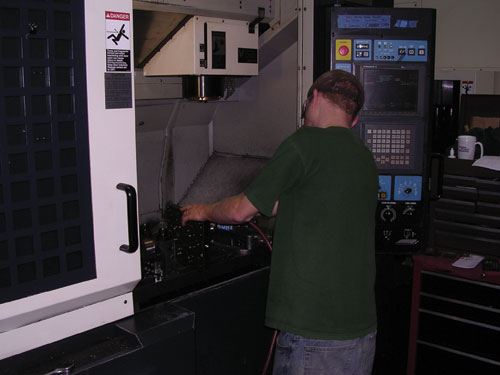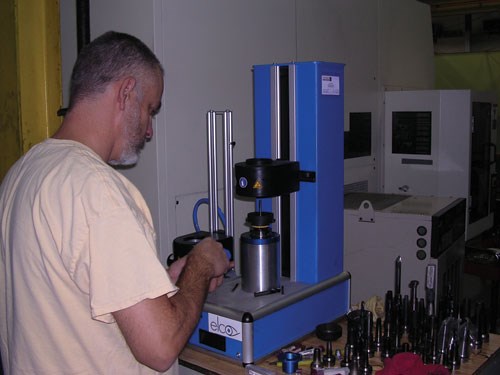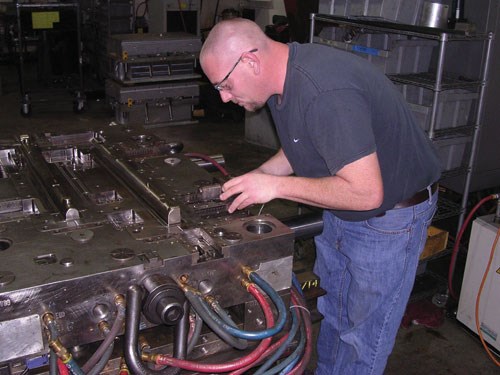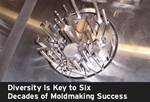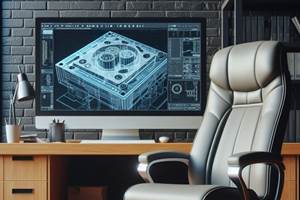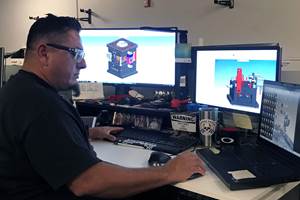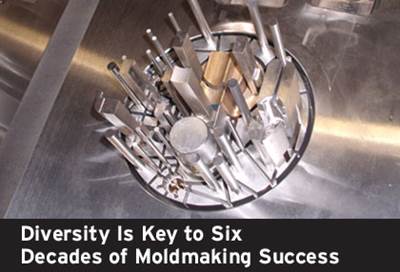Rapid Mold Solutions, Inc.: Three-Pronged Approach to Prototype/Production Mold Manufacture
According to Rapid Mold Solutions President Damian Kuzmin, the company’s business plan was a simple one at the onset. “We wanted to service the prototyping needs of the Big 3 and the Tier 1s that supplied their specialty component needs,” he states, “we learned how to design, build, and produce parts at the price point and timing necessary to earn a lot of business quickly”. The difficult part, as it turned out, was determining what to name the new venture. ‘Radiator Mold Shop’ just wasn’t conducive to future expansion into new markets, so from the acronym RMS, Rapid Mold Solutions was born.”
In the fall of 1998, Damian Kuzmin and Scott Borstorff—who worked together at Carlisle Engineered Products, Inc.—were sipping hot coffee and looking out the window on a typical Northwestern Pennsylvania raw fall day at a vacant building across the street from Carlisle. The two had worked together through several different management groups—including Johnson Controls, Inc. and Carlisle—honing their knowledge of “under-the-hood automotive components” and the rugged, robust tools necessary to form the parts. The proverbial “writing on the wall” from upper-level management, combined with a yearning to strike out on their own and a vacant opportunity across the street, was the catalyst they needed to forge a new name in the Erie area industrial landscape—Rapid Mold Solutions, Inc.
According to Rapid Mold Solutions President Damian Kuzmin, the company’s business plan was a simple one at the onset. “We wanted to service the prototyping needs of the Big 3 and the Tier 1s that supplied their specialty component needs,” he states, “we learned how to design, build, and produce parts at the price point and timing necessary to earn a lot of business quickly”. The difficult part, as it turned out, was determining what to name the new venture. ‘Radiator Mold Shop’ just wasn’t conducive to future expansion into new markets, so from the acronym RMS, Rapid Mold Solutions was born.”
Not long after that, the first request for production tooling came across their desks and the current form of RMS began to take shape. “The expansion of the business into production tooling necessitated a move to a bigger facility capable of handling additional machines and capacity, and again in 2003 to a larger facility yet, the current location on Pacific Avenue in Erie,” RMS Vice President Scott Borstorff notes. The business model itself underwent an array of changes from 2003 to 2008 as new markets were tapped and the array of capabilities on the shop floor changed as well. From its automotive roots, RMS expanded into caps and closures, consumer products, electrical components, sporting goods and the medical device sectors—servicing both prototype and production tooling needs for an increasingly diversified customer base.
A Three-Pronged Approach
RMS is comprised of three business centers: the in-house design and manufacture of prototype and production injection molds, the repair and alteration of injection molds built by RMS or other moldmakers, and production machining. “These three prongs are fed by a focused sales effort involving upper-level management, production and engineering staff, and direct sales contacts to create a dynamic workplace environment where variety and innovation are enthusiastically accepted and consequently promotes a culture of team interaction and shared learning experience,” says Matt Cannon, Sales Manager of Rapid Mold Solutions. “Our internal ‘Big 3’—including Damian, Scott and CNC Department Manager and Manufacturing Floor General Tim Peterson—have developed several procedures that would typically utilize EDM technology by devising means by which the same or better results can be obtained with milling technology. It is fascinating to watch these guys implement their unique skill sets in our day-to-day operations.”
According to Peterson, one of the company’s biggest and ongoing challenges lies in keeping a constant, consistent flow of information between sales, engineering, and the floor. “To address this challenge, weekly meetings between all departments are held to keep the entire team informed as to status of jobs working their way through the system, new ones entering the system, as well as individual ‘kick-off’ meetings involving sales, engineering, CNC, EDM and toolmakers when new builds, engineering changes, and repair work to coordinate each department’s role in fulfilling the work requirements,” Peterson elaborates.
The company has also added some new technology in the mill department which is already paying dividends, Peterson continues. “Our inductive tool shrink fitter is cutting tool mounting times by upwards of 30 percent; and our tool pre-setter with vision system is cutting set-up times dramatically by enabling the quality department to take on the task instead of the operator as well as giving us the ability to calibrate specific tools to specific sleeves,” he states. Additional benefits from the new system include increased tool life, improved machining conditions and tool performance repeatability with the specific calibration techniques, Peterson adds.
Team Building
To keep up with attrition and expanding capacity, RMS has taken a multi-faceted approach to addressing its personnel needs, Kuzmin notes. New talent is acquired through online advertising, direct solicitation of local vocational technical schools, and word-of-mouth throughout what Cannon calls the “capitol of the tool & die industry”—northwestern Pennsylvania. “For the younger, less experienced recruits, a mentor in their chosen specialty department is assigned to them to help address concerns and questions,” Kuzmin says. “This less restrictive, more casual approach has reaped benefits for RMS and led to productive employees in a shorter period of time. The additional benefits to this mentor approach include more rapid integration of the new hire into the team concept, the ability to have less seasoned employees address the variety of work that permeates the shop floor, and a hands-on approach that is truly ‘learn while you earn.’” To further enhance the learning experience of the “new recruits”, they often participate in the part production process from the prototype tools. Actually molding the parts and pulling hand-loads press side enables them to develop a much more thorough understanding of the components, actions, and overall function of the tools used to make various features of the parts.
To further enhance the team concept, RMS has several other unique activities and opportunities that enable employees to regularly interact outside the confines of the regular workplace atmosphere. “One of the common threads that tie many in the region to one another is a shared love for the outdoors, and RMS is no exception,” Cannon notes. “From Damian’s love of the pursuit of waterfowl to Scott’s love of snowmobiling and golf to my love of fishing, guys throughout the shop regularly get together on the weekends to enjoy the natural bounty of the region,” he comments. “This enthusiasm for the outdoors is taken a step further with regularly planned, theme meals served during lunch. Some of these meals have included fried walleye and grilled King Salmon. It is often commonplace to see a Ziploc bag of fresh deer jerky or goose sausage stick passed around the shop during December and January.” The most noticeable team building exercise that takes place at RMS can be heard throughout the shop during 9:30 a.m., lunch and 2:30 p.m. breaks when the tell-tale explosions from “Call of Duty 4” ring throughout the facility, Cannon adds.
A New Mindset
As RMS continues to evolve, there is a movement underway to change the way in which the mindset of the organization functions. “The industry has changed, and RMS will lead the industry in adapting to those changes,” Cannon notes. “No longer is a moldmaker a manufacturer; the once time-consuming and cumbersome design and manufacturing processes have been streamlined with the advent of new technologies and more efficient, faster machines. The modern moldmaker has become a service provider—in essence a contract manufacturer—and needs to develop a customer-oriented mindset, high level of customer service, and regular contact with the critical components of the customer’s business from part design and tool engineers, to molding operators, to the sales and management teams in order to truly provide the value a customer requires.”
To adapt to those customer requirements, RMS has implemented the regular use of online meeting software to coordinate part design discussions and tool design reviews with customers. According to Cannon, this tool has expanded contact with customers and provides a unique platform by which both sides of the equation can develop a better understanding of form, function and design. “Sales calls are no longer just salespeople, but upper-level management, mold repair technicians, and engineering staff from time to time,” Cannon concludes. “This new approach to sales calls creates a more significant bond of trust between customer and moldmaker. We are always looking for ways to improve customer interaction.”
For More Information
Rapid Mold Solutions, Inc. / (814) 833-2721
mcannon@rapidmoldsolutions.com / rapidmoldsolutions.com
Related Content
Tackling a Mold Designer Shortage
Survey findings reveal a shortage of skilled mold designers and engineers in the moldmaking community, calling for intervention through educational programs and exploration of training alternatives while seeking input from those who have addressed the issue successfully.
Read MoreMMT Chats: Solving Schedule and Capacity Challenges With ERP
For this MMT Chat, my guests hail from Omega Tool of Menomonee Falls, Wisconsin, who share their journey with using enterprise resource planning (ERP)—and their people—to solve their schedule and capacity load monitoring challenges.
Read MoreThe Role of Social Media in Manufacturing
Charles Daniels CFO of Wepco Plastics shares insights on the role of social media in manufacturing, how to improve the “business” side of a small mold shop and continually developing culture.
Read MoreMold Design Review: The Complete Checklist
Gerardo (Jerry) Miranda III, former global tooling manager for Oakley sunglasses, reshares his complete mold design checklist, an essential part of the product time and cost-to-market process.
Read MoreRead Next
Diversity Is Key to Over Six Decades of Moldmaking Success
In 1945, George Carson dreamt of owning his own business. So he founded Carson Tool & Mold (Kennesaw, GA) in his garage, and hired his first employee—George Myers. Carson ran the shop until he retired in 1988 and Myers continued to build the business, passing the reins to his son David, who currently serves as president after purchasing the company in 1996.
Read MoreHow to Use Strategic Planning Tools, Data to Manage the Human Side of Business
Q&A with Marion Wells, MMT EAB member and founder of Human Asset Management.
Read MoreReasons to Use Fiber Lasers for Mold Cleaning
Fiber lasers offer a simplicity, speed, control and portability, minimizing mold cleaning risks.
Read More
